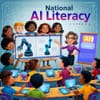India's push for artificial intelligence (AI) literacy is gaining momentum, with experts emphasizing its importance for the country's growth and innovation. To stay competitive globally, India needs to develop a comprehensive AI literacy program, starting with school education.
AI literacy is crucial for India's economic competitiveness, innovation and societal wellbeing. It enables individuals to effectively collaborate with AI systems, critically evaluate AI-generated content and creatively solve real-world problems. This literacy goes beyond coding or programming, focusing on understanding AI systems, working effectively with them and interpreting AI-generated content critically.
India's approach to computational thinking and AI education has been narrow, largely industry-focused and limited to IT-specific training programs. To overcome this, experts suggest integrating AI into school curricula, prioritizing workforce upskilling and ensuring equitable access to AI literacy.
Some notable initiatives are already underway, such as Google's AI education programs, including the Generative AI for Educators course and the Experience AI program, which aim to support educators and students. A national K-12 AI literacy curriculum, experiential AI maker labs and investment in workforce reskilling are essential steps to realize India's potential in AI.
Private sector innovations are also driving AI adoption in various sectors, including agriculture and education. Companies like Wadhwani AI and Sarvam AI are working on AI-powered solutions to address specific challenges.
To emerge as a global leader in innovation, India needs to invest significantly in AI education, research and entrepreneurship. A comprehensive national AI literacy program can help India move beyond its traditional role as a provider of back-office services and IT outsourcing, enabling it to harness the full potential of AI for economic growth and societal wellbeing.


